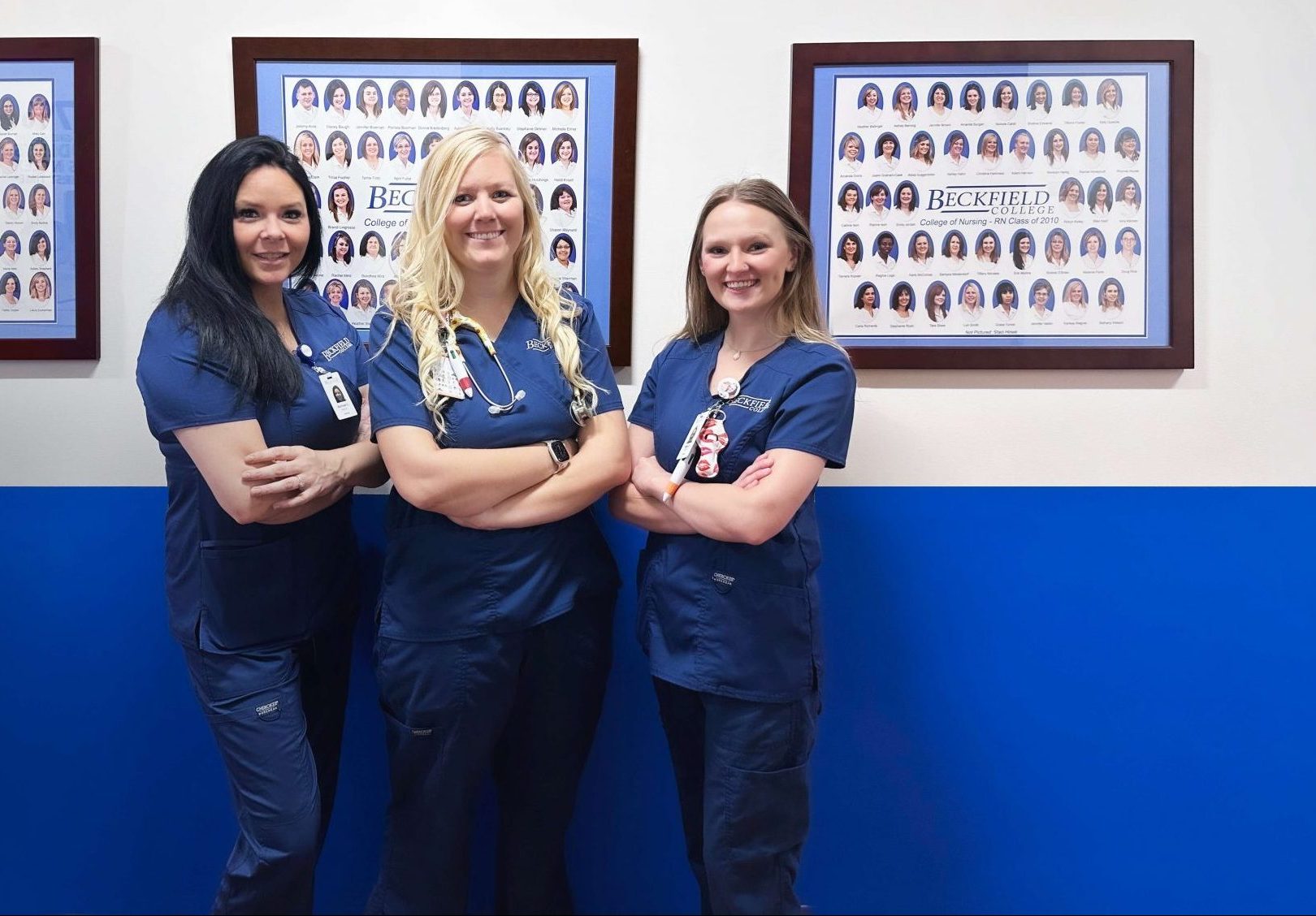Nursing Degrees
Comparing Nursing Degrees – Which One is Right for You?
When thinking about pursuing a career in nursing, there are several things to consider. The first being, which level of nursing education is right for you? You can become a licensed practical nurse (LPN), a registered nurse with an associate’s degree (ADN), or a registered nurse with a bachelor’s degree (BSN). Depending on which path you choose, your job roles and responsibilities, along with salary, will vary. Due to an aging population and an increase in demand for healthcare services, both LPN and RN occupations can expect faster than average employment growth. The Bureau of Labor Statistics (BLS) projects a 9% job growth rate for LPNs and 7% for RNs from 2019-29. Below we help break down the different types of nursing programs that we offer at Beckfield College.

Licensed Practical Nurse
An LPN diploma is for students who want to enter the nursing field without the time and cost of earning a college degree. LPN programs prepare you to work under the supervision of RNs and perform the following key duties:
- Take vital signs
- Prepare and give injections
- Provide basic bedside care
- Assist with laboratory tests and procedures
- Administer medication
- Provide infant care
In addition to clinical applications, you’ll also learn about general medical topics that include anatomy, physiology, psychology, medical terminology, and maternal–child nursing.
An LPN diploma could be right for you if:
- You are a recent high school graduate who wants a nursing career without committing to a traditional college degree
- You are a CNA ready to expand their responsibilities and job opportunities
- You are changing your career but cannot afford to take the time required to complete a college degree
LPNs can work as support staff in a variety of settings such as doctor’s offices, nursing homes, rehabilitation centers and hospitals. According to the BSL, the median salary for an LPN in the state of Kentucky is $42,720, and $45,020 in Ohio.
Registered Nurse (ADN)
An Associate Degree in Nursing (ADN) is the minimum degree requirement for becoming a registered nurse (RN). As an RN, you’ll have the credentials necessary to qualify for most nursing jobs that involve providing critical patient care and assisting physicians.
An ADN program will give you the knowledge and experience RNs need to perform the following duties:
- Assist physicians during exams, surgeries, and other medical procedures
- Run diagnostics tests and analyze results
- Review patient treatment plans and chart progress
- Supervise LPNs and CNAs
- Provide patients and families education on treating injuries or illnesses
The curriculum for an ADN also includes studying courses such as anatomy, physiology, pharmacology, mental health and leadership. While LPNs and RNs differ in their scope of practice, their daily duties often overlap. RNs usually have more autonomy, while LPNs primarily handle basic nursing care.
An ADN from an accredited nursing school is a good choice if you want to become an RN without the commitment of a four-year degree. It’s important to note, however, that while this is the minimum requirement for licensing, employers are increasingly making a Bachelor of Science in Nursing (BSN) degrees a requirement for new hires. An ADN program might be the right choice if:
- You are a recent high school graduate who is planning for a long-term nursing career
- You are a career changer who can make the time and financial commitment to earn an RN
- You are someone who wants a career with flexible scheduling and financial security
Like LPNs, RNs can work in a variety of settings within the healthcare sector including hospitals, long-term care facilities, physician’s offices, hospitals, government, and the private sector. According to the BSL, the median salary for an RN in the state of Kentucky is $63,750, and $68,220 in Ohio.
Registered Nurse (BSN)
A Bachelor of Science in Nursing (BSN) is designed for RNs who want to pursue supervisory roles and qualify for higher-paying jobs. Most BSN programs are 4 years, however, at Beckfield College, we offer a 3-year BSN degree to help your fast track your career.
A BSN program will give you the knowledge and experience RNs need to perform as well as advanced duties and responsibilities like managing other nursing staff and leadership responsibilities like scheduling, training, and personnel.
A BSN program might be the right choice if:
- You are a recent high school graduate who is planning a long-term career in nursing and able to make the time and financial commitment
- You are changing careers and can make the time and financial commitment to earn a BSN
The curriculum for a BSN also includes studying advanced science courses such as nursing gerontology, nutrient metabolism, maternal reproductive nursing, and nursing care for children. In addition to advanced sciences, BSNs will also study ethics, disaster management, professional communications, and leadership.
As with RNs with associate’s degrees, salaries vary based on a number of different factors. With a BSN, you can often expect to make more than with an associate degree.
Nursing Certification
Whichever nursing degree level you decide on, you’ll still have to pass the National Council Licensure Examination (NCLEX) if you want to start working as an LPN or RN. Additional requirements may also exist depending on your state, so be sure to look into statewide RN qualifications as well.
Have questions about how to apply to nursing school, or which program is right for you? Fill out this short form to request information or call us directly at 859-371-9393 and our Admissions Team will be there to help!
Earn your nursing degree at Beckfield College! Now enrolling nursing students – licensed practical nurse, registered nurse – classes forming now in the surrounding areas of Southern Ohio and Northern Kentucky!
CALL 859-371-9393, request more information today!
More on nursing degrees
